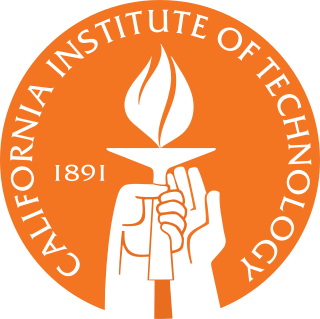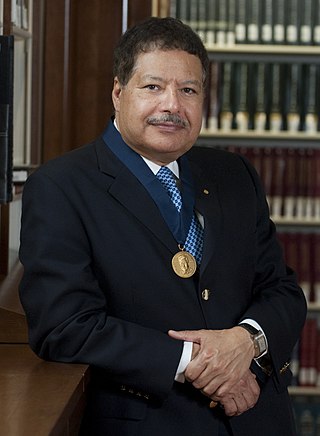Related Research Articles

The California Institute of Technology (branded as Caltech or CIT) is a private research university in Pasadena, California. Caltech is ranked among the best academic institutions in the world, and with an enrollment of approximately 2400 students, it is one of the world's most selective universities. The university is known for its strength in science and engineering, and is among a small group of institutes of technology in the United States which is primarily devoted to the instruction of pure and applied sciences.

Stephen Wolfram is a British-American computer scientist, physicist, and businessman. He is known for his work in computer science, mathematics, and theoretical physics. In 2012, he was named a fellow of the American Mathematical Society. He is currently an adjunct professor at the University of Illinois Department of Computer Science.

Ahmed Hassan Zewail was an Egyptian-American chemist, known as the "father of femtochemistry". He was awarded the 1999 Nobel Prize in Chemistry for his work on femtochemistry and became the first Egyptian to win a Nobel Prize in a scientific field, and the second African to win a Nobel Prize in Chemistry. He was the Linus Pauling Chair Professor of Chemistry, Professor of Physics, and the director of the Physical Biology Center for Ultrafast Science and Technology at the California Institute of Technology.

David Baltimore is an American biologist, university administrator, and 1975 Nobel laureate in Physiology or Medicine. He is President Emeritus and Distinguished Professor of Biology at the California Institute of Technology (Caltech), where he served as president from 1997 to 2006. He also served as the director of the Joint Center for Translational Medicine, which joined Caltech and UCLA in a program to translate basic scientific discoveries into clinical realities. He also formerly served as president of Rockefeller University from 1990 to 1991, founder and director of the Whitehead Institute of Biomedical Research from 1982 to 1990, and was president of the American Association for the Advancement of Science in 2007.

Leroy "Lee" Edward Hood is an American biologist who has served on the faculties at the California Institute of Technology (Caltech) and the University of Washington. Hood has developed ground-breaking scientific instruments which made possible major advances in the biological sciences and the medical sciences. These include the first gas phase protein sequencer (1982), for determining the sequence of amino acids in a given protein; a DNA synthesizer (1983), to synthesize short sections of DNA; a peptide synthesizer (1984), to combine amino acids into longer peptides and short proteins; the first automated DNA sequencer (1986), to identify the order of nucleotides in DNA; ink-jet oligonucleotide technology for synthesizing DNA and nanostring technology for analyzing single molecules of DNA and RNA.

Kip Stephen Thorne is an American theoretical physicist known for his contributions in gravitational physics and astrophysics. A longtime friend and colleague of Stephen Hawking and Carl Sagan, he was the Richard P. Feynman Professor of Theoretical Physics at the California Institute of Technology (Caltech) until 2009 and is one of the world's leading experts on the astrophysical implications of Einstein's general theory of relativity. He continues to do scientific research and scientific consulting, most notably for the Christopher Nolan film Interstellar. Thorne was awarded the 2017 Nobel Prize in Physics along with Rainer Weiss and Barry C. Barish "for decisive contributions to the LIGO detector and the observation of gravitational waves".

Jacqueline K. Barton, is an American chemist. She worked as a Professor of Chemistry at Hunter College (1980–82), and at Columbia University (1983–89) before joining the California Institute of Technology. In 1997 she became the Arthur and Marian Hanisch Memorial Professor of Chemistry and from 2009 to 2019, the Norman Davidson Leadership Chair of the Division of Chemistry and Chemical Engineering at Caltech. She currently is the John G. Kirkwood and Arthur A. Noyes Professor of Chemistry.

Charles Elachi is a Lebanese-American professor (emeritus) of electrical engineering and planetary science at the California Institute of Technology (Caltech). From 2001 to 2016 he was the 8th director of the Jet Propulsion Laboratory and vice president of Caltech.

Daniel J. Kevles is an American historian of science best known for his books on American physics and eugenics and for a wide-ranging body of scholarship on science and technology in modern societies. He is Stanley Woodward Professor of History, Emeritus at Yale University and J. O. and Juliette Koepfli Professor of the Humanities, Emeritus at the California Institute of Technology.

Robert Howard GrubbsForMemRS was an American chemist and the Victor and Elizabeth Atkins Professor of Chemistry at the California Institute of Technology in Pasadena, California. He was a co-recipient of the 2005 Nobel Prize in Chemistry for his work on olefin metathesis.

Bruce Allen is an American physicist and director of the Max Planck Institute for Gravitational Physics in Hannover Germany and leader of the Einstein@Home project for the LIGO Scientific Collaboration. He is also a physics professor at the University of Wisconsin–Milwaukee and the initiator / project leader of smartmontools hard disk utility.

Mark Stephen Wrighton is an American academic and chemist, and the current President of The George Washington University. In September 2021, Wrighton was named the Interim President of The George Washington University for an 18-month term and succeeded Thomas LeBlanc in January 2022. During his time at GWU, he was on sabbatical from Washington University in St. Louis where he is the James and Mary Wertsch Distinguished University Professor and Chancellor Emeritus. Wrighton served as the 14th Chancellor of Washington University in St. Louis from 1995 to 2019.

John Dombrowski Roberts was an American chemist. He made contributions to the integration of physical chemistry, spectroscopy, and organic chemistry for the understanding of chemical reaction rates. Another characteristic of Roberts' work was the early use of NMR, focusing on the concept of spin coupling.
Nathan S. Lewis is the George L. Argyros Professor of Chemistry at the California Institute of Technology (Caltech). He specializes in functionalization of silicon and other semiconductor surfaces, chemical sensing using chemiresistive sensor arrays, and alternative energy and artificial photosynthesis.

Leon Theodore Silver was an American geologist who was professor of geology at the California Institute of Technology (Caltech). He was an instructor to the Apollo 13, 15, 16, and 17 astronaut crews. Working with the National Aeronautics and Space Administration (NASA), he taught astronauts how to perform field geology, essentially creating lunar field geology as a new discipline. His training is credited with a significant improvement in the J-Mission Apollo flights' scientific returns. After the Apollo program, he became a member of the United States National Academy of Sciences in 1974. He retired as the W. M. Keck Foundation Professor for Resource Geology, emeritus, at Caltech.
Michael H. Dickinson is an American fly bioengineer and neuroscientist, and Zarem Professor of Biology and Bioengineering at the California Institute of Technology. He studies Drosophila flight control systems and sensory processing and was dubbed the Fly Guy by The Scientist.

Andrew Perry Ingersoll is a professor of planetary science at the California Institute of Technology. Ingersoll was elected to the American Academy of Arts and Sciences in 1997. He received the lifetime achievement award in planetary science, the Gerard P. Kuiper Prize, in 2007. He proposed the runaway greenhouse effect and is known for his research on planetary atmospheres and climate.
Goverdhan Mehta FNA, FASc, FTWAS, FRS, FRSC is an Indian researcher and scientist.

Santanu Bhattacharya is an Indian bioorganic chemist and a professor at the Indian Institute of Science. He is known for his studies of unnatural amino acids, oligopeptides and biologically active natural products and is an elected fellow of the Indian National Science Academy The World Academy of Sciences and the Indian Academy of Sciences The Council of Scientific and Industrial Research, the apex agency of the Government of India for scientific research, awarded him the Shanti Swarup Bhatnagar Prize for Science and Technology, one of the highest Indian science awards, in 2003, for his contributions to chemical sciences. He is also a recipient of the National Bioscience Award for Career Development of the Department of Biotechnology (2002) and the TWAS Prize (2010).
Ramarathnam Narasimhan is an Indian materials engineer and a professor at the Department of Mechanical Engineering of the Indian Institute of Science. He is known for his pioneering researches on fracture mechanics and is an elected fellow of the Indian Academy of Sciences, Indian National Science Academy and the Indian National Academy of Engineering. The Council of Scientific and Industrial Research, the apex agency of the Government of India for scientific research, awarded him the Shanti Swarup Bhatnagar Prize for Science and Technology, one of the highest Indian science awards for his contributions to Engineering Sciences in 1999.
References
- ↑ "R. Michael Alvarez". VIAF. Retrieved 12 April 2016.
- 1 2 3 4 "Ramon Michael Alvarez CV" (PDF). Retrieved 12 April 2016.
- ↑ "The 2004 Scientific American 50 Award: Policy Leaders". Scientific American. 11 November 2004. Retrieved 12 April 2016.
- ↑ "Newly Elected Fellows". members.amacad.org. Archived from the original on January 14, 2019. Retrieved January 13, 2019.